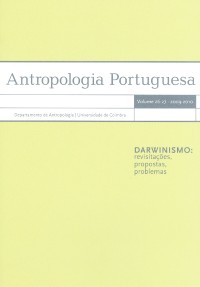Please use this identifier to cite or link to this item:
https://hdl.handle.net/10316.2/28702| Title: | A missão em guerra: a história oculta da colecção de crânios de Timor da Universidade de Coimbra | Authors: | Roque, Ricardo | Keywords: | Human skulls;anthropological collections;missionaries;colonial history;East Timor;Crânios humanos;colecções antropológicas;missionários;história colonial;Timor Leste | Issue Date: | 2010 | Publisher: | CIAS - Centro de Investigação em Antropologia e Saúde | Abstract: | This article explores the turbulent colonial history of the collection of
skulls from Timor held at the University of Coimbra. In the 1930s-40s the uncertainty
about the provenance of this collection caused a heated Portuguese controversy on
the authenticity of the skulls and the anthropological classification of Timor. Using
new historical evidence, this article offers the hidden history of the collection. It
reveals how, in Timor, the skulls were collected, informed and documented by
Portuguese catholic missionaries, in the course of conflicts and crises during, and
after, the “war of Laleia”, between 1878 and 1881. Thus the collection is intimately entangled with these political and epistemic processes of hostility. By revealing this hidden history, this article also suggests that the study of the colonial history of scientific collections should take into account two inter-related processes: the acquisition and appropriation of collections in the field, and the circuits of information and documentation associated with that acquisition. Este artigo explora a turbulenta história colonial da colecção de crânios de Timor da Universidade de Coimbra. Em Portugal, nas décadas de 1930 e 1940, a incerteza acerca da proveniência da colecção motivou acesa controvérsia sobre a sua autenticidade e a classificação antropológica de Timor. Com base em documentação inédita, este artigo expõe a história oculta da colecção. Revela-se aqui o modo como, em Timor, os crânios humanos foram adquiridos, interpretados e documentados por missionários católicos, no quadro de crises e conflitos que eclodiram durante e após a “guerra de Laleia”, entre 1878 e 1881. Por conseguinte, esta colecção está intimamente imbricada nesses processos políticos e epistémicos de hostilidade. Ao revelar esta história oculta, o artigo pretende também sugerir que o estudo da história colonial de colecções científicas deve atender à articulação entre dois processos: a aquisição e apropriação de colecções no terreno, e os circuitos de informação e documentação associados aos modos de aquisição. |
URI: | https://hdl.handle.net/10316.2/28702 | ISSN: | 2182-7982 | DOI: | 10.14195/2182-7982_27_14 | Rights: | open access |
| Appears in Collections: | Antropologia Portuguesa |
Files in This Item:
| File | Description | Size | Format | |
|---|---|---|---|---|
| ap26-27_artigo15.pdf | 1.63 MB | Adobe PDF |  |
Items in DSpace are protected by copyright, with all rights reserved, unless otherwise indicated.
